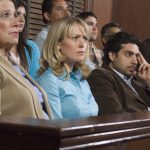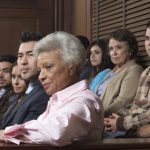NSW Jury Duty: What to Expect if Called Up

Many believe serving on a jury is an important part of their civic duty. But there are others who find it an unrealistic burden that can have severe financial and emotional consequences.
Some of the more bizarre excuses prospective jurors have provided to get out of jury service in NSW include an allergic reaction to air conditioning, a public transport phobia, a tendency to fall asleep that leads to distracting snoring, and the need to look after a cat.
None of these excuses were accepted by the Office of the Sheriff of NSW, which administers the jury system in this state. This massive task involves 250,000 people a year, only 3 percent of which end up actually serving on a jury. In some cases, those who are chosen don’t take the duty as seriously as they perhaps should.
For example, a jury in a trial at Downing Centre District Court in 2008 decided to entertain itself by doing sudokus in the courtroom. After the judge discovered five jurors solving the puzzles, he dismissed the jury three months into the trial, which had already involved the testimony of over 100 witnesses and hundreds of thousands of dollars in public funds.
And NSW District Court Judge Peter Berman had to dismiss a jury in 2015, after he caught one juror flirting with the defendant. The woman was seen flicking back her hair, smiling, raising an eyebrow and nodding at the man in what was described as a suggestive manner.
The role of the jury
In NSW, criminal trials in the supreme and district courts are generally tried by juries, which consist of twelve members of the public. Potential jurors’ identities are not revealed in court and members of the jury panel are referred to by numbers.
At the time of choosing a jury, a randomly selected pool of jurors is told the general details of the case and a list of witnesses is read to them. Those who feel they cannot act impartially due to the facts of the case or identities of witnesses can ask for permission to be excused. In that case, the presiding judge can ask them to give evidence on the witness stand regarding the basis for their perceived impartiality. However, it is ultimately up to the judge to decide whether a member of the jury panel is excused.
Once 12 jurors are chosen from a panel of many more than that who sit in the back of the courtroom in anticipation of their number being chosen, both the defence and prosecution have the opportunity to challenge up to three members – in which case they are replaced by new people from the panel. The prosecution has three challenges for each accused – which means, for example, they can challenge up to nine members if there are three coaccused.
The role of the jury is to hear the evidence and then find facts in accordance with the law that is explained to them by the judge. The explanation is called the judge’s directions. The jury is meant to apply the directions in deciding whether the accused is guilty or not guilty, which is known as the verdict. The jury must select a foreperson when it is retires into the jury room. That person has the role of managing the juror and ultimately delivering the verdict.
The NSW jury service system is regulated by the Jury Act 1977 (the Act). Section 68B of the Act stipulates that a juror must not disclose information about jury deliberations or decisions to anyone other than a jury member. A contravention of this rule amounts to a crime which carries a maximum penalty of a $2,200 fine.
The same section prohibits disclose such information for a reward, which can result in a $5,500 fine. And section 68C makes it a crime to make personal inquiries about a trial. The maximum penalty for this offence is 2 years behind bars and/or a fine of $5,500.
Getting called up
The jury role is a list of names of people who’ve been randomly selected by computer from the NSW Election roll. If an individual is selected they are then sent a notice of inclusion that informs them that they could be called up for jury service during the next 12 months.
Following that, a person may subsequently receive a jury summons. This is issued a month prior to the court attendance date. If a summons is received, it does not mean an individual will serve on a jury, as twelve members are randomly selected from a larger group summoned on the day.
Exemptions and exclusions
Section 5 of the Act provides that “every person who is enrolled as an elector for the Legislative Assembly of New South Wales is qualified and liable to serve as a juror”. However, there are some exemptions and exclusions as to who can sit on a jury.
Persons that are excluded from jury service are listed under schedule 1 of the Act. These include people who’ve been convicted of serious crimes, such as a terrorist offence or some sexual offences, as well as lawyers, and individuals holding certain official positions, such as MPs.
And a list of people who are entitled to an exemption is contained in schedule 2. It includes members of the clergy, dentists, medical practitioners, emergency services staff and full-time carers. But if you don’t fall into either of these lists, you can still be excused.
Excuses, excuses…
Section 14A of the Act sets out what constitutes as “good cause” when requesting to be excused from jury service. This can be granted if it’s considered that service would cause “undue hardship or serious inconvenience” to an individual, their family or the public.
Another reasonable excuse is a disability that would render a person incapable of participating. A conflict of interest or some other knowledge can see someone excused from jury duty. And it’s also open to put forth some other reason to claim an inability to serve.
A good lawyer can be of help in considering whether a valid exemption does exist. And those that are aware that they should be excluded or excused must inform the sheriff prior to their court attendance date. This can be done by logging into the Juror site.
However, it’s best to remember that no matter how much you want to skip jury duty, you shouldn’t provide false or misleading information to the sheriff, as this is an offence, under section 62 of the Act, which is punishable by a fine of $5,500.
And if you haven’t already organised an exemption from jury service with the sheriff prior to the court attendance date, you must show up, as failure to do so can result in a $2,200 fine, under section 63 of the Act.
Financial compensation
Jurors are paid $106.30 a day. And for those who are employed and are required to sit on a jury for more than ten days, the daily allowance grows to $247.40 from day eleven onwards. And jurors are also provided with daily travel and refreshment allowances.
For those concerned about their employer’s reaction, there’s no formal need to be. Employers are required to release an employee for jury service. They’re also required to pay their first 10 days of service. And they are prohibited from doing anything detrimental to an employee, such as sack or otherwise penalise them.








